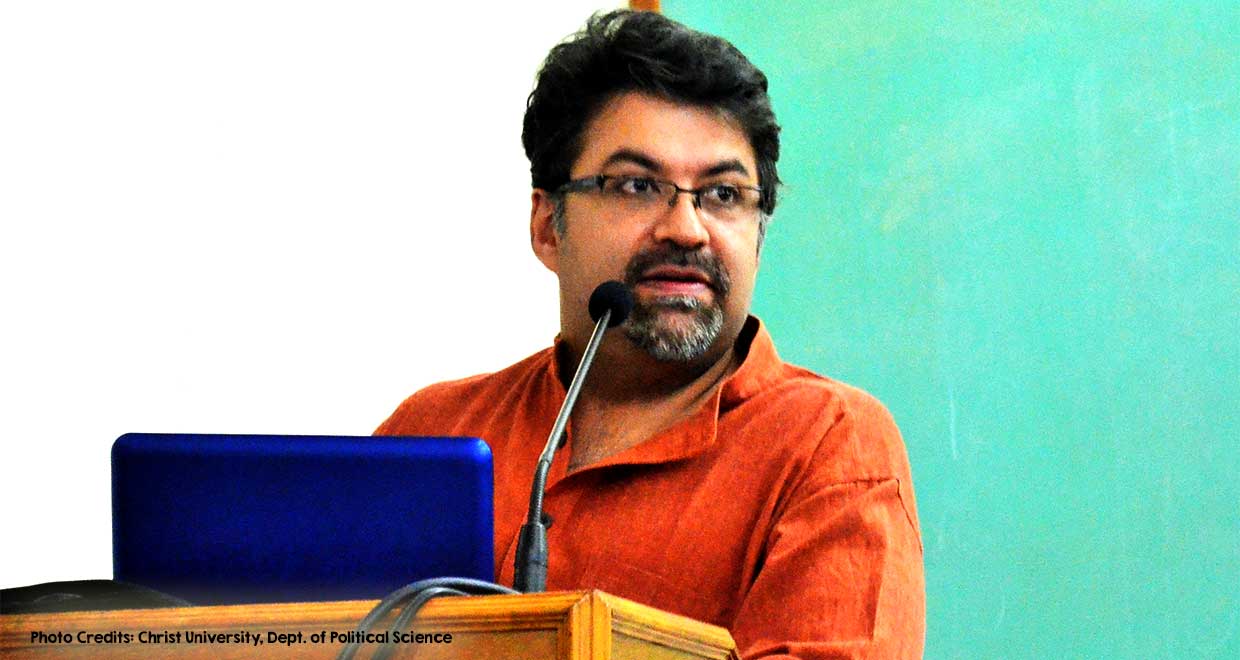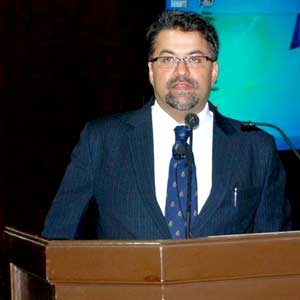Aditya Sondhi is an alumnus of the NLSIU, Bangalore. He graduated from NLSIU in 1998, and had thereafter independently set up his litigation practice, ‘brick-by-brick’. He was recently (in June, 2014) designated a Senior Counsel at the Karnataka High Court.
In this interview, he reckons his first hearing at the court and shares with us his in-depth experience of advocacy. There is so much to learn from here. Read on!
Please tell our readers what motivated you to take up legal studies?
I was an accidental lawyer. One had heard of the NLSIU at Bangalore in the early 1990s, and when the entrance exam came along, I sat for it just for a lark. My plans were to go to England after my 12th standard. As it turned out, I cleared the Law School exam and ended up staying on in Bangalore.
Have the NLUs been able to produce socially relevant lawyers? What is your take on this, given that many chose to take up firm jobs?
Quite so, because those who have taken up social-action practice have made their mark. There is a saying in Hindi – Sau sonar ki, ek lauhar ki (For a hundred blows of a goldsmith, a single blow of the blacksmith). Despite many NLU alumni taking up corporate law at firms, the few who have taken up socially relevant lawyering have [sociallocker] more than made up for their tribe. Like my classmates and friends at the ALF.
How was your law school experience at NLSIU? Are there any memorable moments which you would like to share?
I was fairly nonchalant about being in NLS and hence didn’t necessarily get very deeply influenced by the ethos of the place. Equally, my contribution to the institution as a student was negligible. I do, however, vividly remember our founder-director Dr. Madhava Menon at the orientation programme in 1993, clearly mentioning that the object of the Law School was to contribute purposefully to the Bar. For me, that was a clarion call of sorts and helped me take up litigation once I graduated without even an iota of doubt.
How do you say a law student can shape up his profile for litigation while still in law school? Do moots and academic writing help?
Moots and academic writing scarcely help one shape up for practice. Though moot courts may give a mild flavour of what it is like to prepare and argue a brief, the lack of accountability to a real client or a real cause makes the experience artificial. Academic writing in fact makes it difficult to adjust to pleadings for court, which are meant to be concise, uncomplicated and largely factual. Even the legal grounds that are pleaded are expected to be scholarly, yet pithy. Closer attention to research and strenuous litigation internships can surely muster up a skill-set that comes handy in the long run. Most importantly, law students must stay clear of the anti-litigation propaganda that goes around and make up their own minds about practice.
How were the first few years after your graduation? Would you say law school prepared you for the real world practice of law?
They were the toughest years of my life. Simply, because I realized how ignorant and wet behind the ears I was. It was more a case of trying to survive in practice, rather than succeed. This was due to the fact that one knew so little and experience could only be gathered the hard way. Law School did not prepare me for this episode, as the culture in NLS was generally removed from litigation and concentrated more on academia and corporate, in-house practice. Of course, the few professors who had shown us glimpses of the real world outside, like Dr. Lalit Kumar Rao (may he rest in peace), were valuable mentors.
Please tell us about how you decided to pursue litigation. What were the other opportunities you were considering?
As I said earlier, Dr. Menon’s message stayed with me. This, coupled with the fact that I was offended by very senior professionals coming down for pre-placement talks and simply selling their firms to the students. I always wanted to work in an environment where I would be inspired by my seniors. Not be seduced by them to join them. That changes the entire grain of how you approach your life ahead. A robust placement in my fourth year with Mr. Dipankar Gupta in the Supreme Court and in the final year with Mr. Udaya Holla clinched it for me.
Did you have a mentor while in your formative years of your practice? How was your experience arguing at the court for the first time?
Not directly, but Mr. Holla shaped my career tremendously by simply giving me opportunities to argue matters in the High Court from the day I enrolled. His style of mentorship is quite stringent and effective – to throw you in the deep and let you swim for yourself. Something he has done himself with remarkable élan. On the evening that I got my sanad, when I offered my senior some sweets, he reciprocated by offering me two files for the next day to argue in Court!
One was a writ petition before the legendary Justice R V Raveendran, in which former Advocate General Mr. B V Acharya appeared for the petitioner, and I could not get to open my mouth for the respondent! Not so much out of fear, but more because I had over-prepared for the case and did not know where to begin. (Fortunately for me, the other case allotted to me was adjourned!).
What was the attitude of judges towards new advocates? Has it changed over the years? Are there any specific challenges to be faced on the first day?
As I recounted my first hearing above, I can say that soon enough I became confident to argue more assertively and calmly in Court, and tribute here must be paid to some wonderful judges at the time who were most encouraging to juniors. I can recall Justice Dattu, Justice Rangavitalachar, Justice P V Reddy, Justice Mohan Kumar, Justice Thakur, Justice PatriBasavangoud and Justice Rajaratnam, among many others. Some of them were tough task-masters but at the same time, never bullied or discouraged juniors. This brings out the best in junior advocates – knowing they need to be fully prepared and that the Court will hear them impartially. The greatest challenge in the beginning is the mind-block that one has with the system – uncertainty as to how the Courts will treat a new entrant. Good seniors and judges help you keep the faith.
How do you say we can boost the fiduciary relations between clients and us? How many years of practice would you say is required to build a firm clientele?
One good performance is sufficient to build faith in the party. Clients, generally, only expect their Counsel to be prompt in their filings, honest to the T and to give it their best when the case is heard. Of course, the unethical practice of soliciting clients makes it very difficult for solo, first-generation practitioners who stay true to their code of conduct. I would say, my clientele was never as large as many other lawyers. However, it was built brick-by-brick, and that takes years.
What all does a Senior Counsel have to do? Please tell us about a typical work day.
Seniors have the benefit of not having to worry about mundane, micro-management of cases and are only required to argue their matters to the best of their ability, after being briefed by the advocate on record. However, the very fact that one is a designated Senior mandates greater preparation, better submissions and total fairness to the Hon’ble Court. Typically, a day entails briefings by Counsel on record and interaction with juniors to prop up the research. Thereafter, it’s a question of waiting your turn in Court and arguing the brief. Evenings are at Chambers, where briefings and reading continue.
What are your core areas of practice? How do you say one can find his domain?
I’ve always maintained that litigation is a speciality in itself and thereafter one may or may not concentrate on any core area of law. I would say my work broadly covers commercial and constitutional law, on both the civil and criminal side. Having said that, there is a great thrill in arguing newer areas of law, where one is outside his / her comfort zone and where one must work doubly hard to do justice to a brief. Unless one already knows what area of law he should practice in, it is best to free-fall and discover the areas of interest as one goes along.
What is the transformation from being a Counsel to Senior Counsel like? Are business development skills mandatory at such higher roles?
A designated Senior Counsel at the time of his / her designation must already be made of the stuff that is expected of a Senior. If that is so, the transition is not so sharp, though one does face several practical changes in terms of retiring from pending cases, avoiding direct client interaction and so on.
I’m afraid, that the words ‘business’ and ‘practice’ do not go together in the profession. The skills are professional and entail the entire gamut of skills required for better advocacy. Not least, a high degree of ethics, which one must constantly strive to uphold. And which is no easy task.
How did you take time out for pursuing higher studies? Would you say higher studies are necessary for a career in litigation?
I got my masters’ in political science through correspondence and thereafter a PhD, while I was practising. This I did only because I missed the academic side a little. Otherwise, neither did I intend to pursue an LL.M nor do I think one can afford to take much time off from practice to pursue higher studies. Particularly, if you are a first-generation lawyer and have to stay at it from day one.
What are the skills that you look for when you hire juniors under you? How do you reckon that law students should develop these skills?
The hunger to learn and the modesty to know that they know very little. My chambers are ill-suited for juniors who are smug and all-knowing. These are not so much skills as they are an attitude. And that attitude needs to be developed by introspection.
When you accept interns under you, what kind of qualities do you look for? How do you say interns should go about their work so as to get noticed in a positive way in the limited time they have?
I find it quite difficult to screen interns considering the number of students who apply. And I get all sorts. Really good, keen interns and others who are there as a formality. Interns clearly need to slog and make the most of their time in Court, without waiting to be spoon-fed assignments. Internships are meant to get a feel of what Courts are like, and that effort has to come from the interns themselves. A lot of them sit around hoping I will do the needful for them. And they are usually disappointed.
Having mentored quite a few students have you found any difference between NLU and Non-NLU students? Do you think law schools have a role to play in one’s career trajectory?
Non-NLU students show a greater hunger to learn, especially non-NLSIU ones. There is no chip-on-the-shoulder and there is an eagerness to show the world that one’s aptitude does not necessarily depend on the law school that they come from. In any case, NLSIU alumni do not choose to work with me and I have had all of two NLSIU products work with me in all these years! My best juniors have come from the local law colleges. My first junior, Nidhishree, was a gold-medallist from the ULC, Bangalore and has proved to be fine advocate with a bright future ahead of her.
Is there any other suggestion you would like to give to our budding lawyers?
The Law is an amazing universe – with diversity and depth, with unsolved mysteries and with room for everyone who accepts it whole-heartedly. But, as they say in cricket, no one is bigger than the game.
[/sociallocker]


























